Killer Coke Newsletter | February 11, 2013
Campaign wins broad support at Shut Down School of Americas Vigil
Contents of the Newsletter
- University of Albany/SUNY Student Association votes to kick Coke
- Street Hype cover story: "Food Co-op Votes to Boycott Coca-Cola"
- Ray Rogers interviewed on Radio Paul's Radio Rants
- TIAA-CREF under fire over construction sweatshops, tobacco & Killer Coke
- Deborah Kropp wins more than $1 million from Coke
- Campaign wins broad support at Shut Down School of Americas Vigil
- Soft drinks make Coke's polar bears unhappy and sick
- Joe Pilati (1947-2012)
1. University at Albany/SUNY Student Association votes to kick Coke
Student activist Cathy Rojas reported that the Student Association of the University of Albany/State University of New York passed a resolution on December 5, 2012 seeking to make the University at Albany and all other SUNY campuses Coca-Cola-free.
The resolution highlights the horrors of racial discrimination at Coca-Cola bottling plants in New York; the ongoing violence against union leaders and family members to destroy unions in Colombia and Guatemala, the use of illegal child labor to harvest sugar cane for Coke's sugar processors in El Salvador and the overexploitation and pollution of scarce water resources in India leaving large populations of people with no water for irrigation, drinking and sanitation.
The resolves in the resolution are:
THEREFORE, BE IT RESOLVED that the SA Senate recommends to University at Albany that the campus not serve Coca-Cola products on its campus, including at its events, meetings, conferences, and delegate assemblies,
AND BE IT FURTHER RESOLVED that the SA Senate recommends to the University at Albany that it urge all SUNY campuses to press for the termination of contracts with Coca-Cola.
2. Street Hype cover story: "Food Co-op Votes to Boycott Coca-Cola"

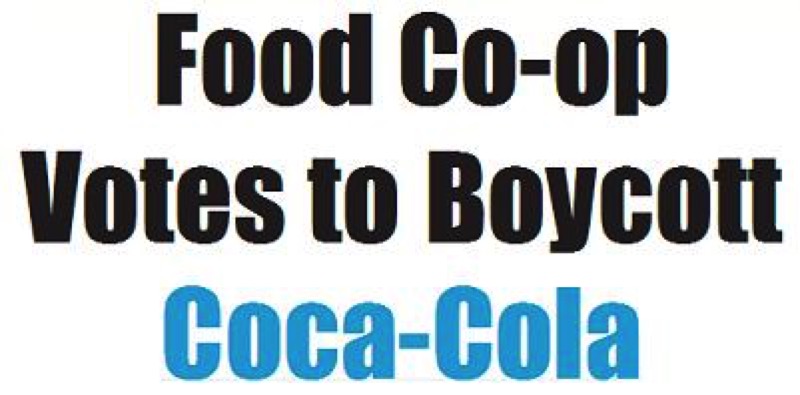
Street Hype, the newspaper that covers the Jamaican community in the New York/Tri-State area, wrote a front page article entitled "Food Co-op Votes to Boycott Coca-Cola."
"The Park Slope Food Coop (PSFC) in Brooklyn, with a membership of more than16,000 working members, voted on November 27 at its general meeting with 300 members present to boycott all Coca-Cola products.
"The meeting is the top decision-making body of the co-op. The vote continues the banning of Minute Maid juices, Odwalla juices and smoothies and Honest Tea, which used to be sold at the PSFC."
Issues highlighted at the Park Slope Food Co-op meeting described in this article are racial discrimination in Coke plants, violence against union leaders in Latin America, and the aggressive marketing of unhealthy beverages to children, especially in minority communities.
3. Ray Rogers interviewed on Radio Paul's Radio Rants
Radio Paul's Radio Rants
Episode #22, Guest: Ray Rogers
Killer Coke vs. KillerCoke.org
November 26, 2012

Ray Rogers of KillerCoke.org explains how Coca-Cola not only has been rotting teeth, but human rights. Both in the United States and abroad Coke has been involved in some of the most egregious human rights abuses
Listen and hear about what Coke does in your name with the money you use to buy their products and learn what you can do to make real change.
4. TIAA-CREF under fire over construction sweatshops, tobacco & Killer Coke
The New York City District Council of Carpenters has partnered with Corporate Campaign, Inc., founder of Campaign to Stop Killer Coke, to develop the Campaign to Stop Construction Sweatshops. This Campaign could have national implications.
The goal of the Campaign is to secure justice for carpenters and other construction workers in New York City & vicinity, the construction capital of the United States.
The literature of the District Council notes that TIAA-CREF, which touts its commitment to social responsibility and "investing for the greater good" is not only hypocritically investing in construction sweatshops, but is also investing billions in Killer Coke and tobacco.
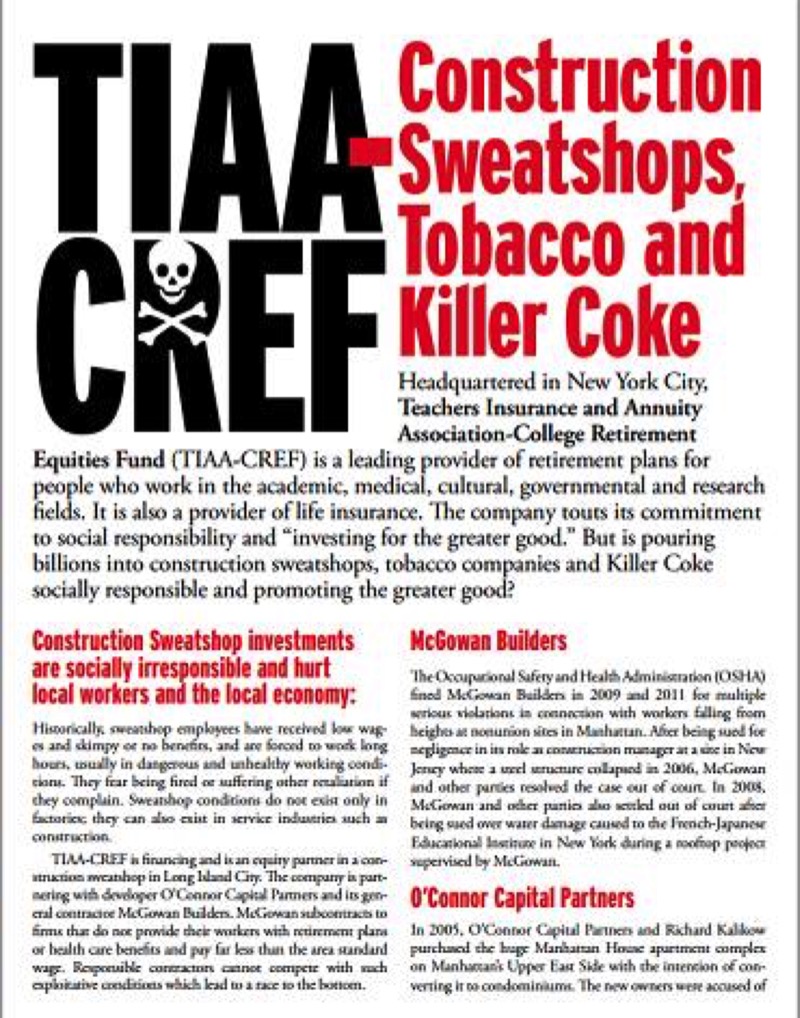
Please take a moment to support construction workers and victims of Killer Coke.
Visit this page and send an email to TIAA-CREF
The Campaign to Stop Construction Sweatshops website
Campaign Facebook page, please click on Like
Here is the brochure entitled "TIAA-CREF: Construction Sweatshops, Tobacco and Killer Coke" that is being is distributed by the Campaign to Stop Construction Sweatshops.
5. Deborah Kropp wins more than $1 million from Coke
"EVERYTHING DOES NOT GO BETTER WITH COKE; The Deborah Kropp Story" from Insider Exclusive, first broadcast 2012
Read Article and be sure to watch the first two minutes of the video where Deborah describes how Coke and its lawyers acted to undermine her case by using dirty tactics to destroy her credibility.
.jpg)
Watch on YouTube
"On July 20, 2007, Deborah Kropp was traveling home from helping her quadriplegic brother as she did every day...A few hundred feet from her Gainesville, Florida home, she slowed down to pull off the road at her rural mailbox, as she did every day. And that's where this tragic Coca Cola story began...Coca-Cola, which was 'under-staffed,' ...according to its own employees...relied on a warehouse worker with a 'less than stellar' driving history and several felony convictions to deliver their product on that fateful day...
" '...the Coca-Cola's truck had a loose toolbox in the passenger compartment...' that 'rocketed onto the truck's accelerator, sending the truck out of control and slamming into the rear passenger side of Deborah's Ford Mustang and it sent her airborne.
"...Coke never apologized, and yet they used unlimited resources to blame the victim, Deborah Kropp...
"...You might think that such an iconic American brand...would stand up and help the people they hurt ...but in this case they failed to do so..."
When asked about her attitude towards Coke, Ms. Kropp said:
"They are UnAmerican!"
"There is no justice when it comes to Coca-Cola."
Coca-Cola has a poor history pushing their drivers beyond the limits of fatigue all in the name of profit.
Here's a horrific accident story from Tanzania that Coke has yet to explain: Coke's Crimes in Tanzania
In this story, 10 children were killed.
6. Campaign wins broad support at Shut Down School of Americas Vigil
For the fourth consecutive year, members of the Campaign to Stop Killer Coke joined thousands of others at the School of Americas (SOA) Vigil in Columbus, Georgia. From November 16th-18th, we stood in solidarity with our brothers and sisters around the globe and urged the US Government to shut down the military school that has been associated with torture, murder and military repression throughout Latin America.
On Saturday evening, more than 150 people attended the "Killer Coke" Workshop and we were pleased to meet with students from dozens of universities and colleges eager to rid their respective schools of Coca-Cola products. As is always the case at the School of Americas Vigil, we distributed thousands of our newest Killer Coke leaflets and were met with great enthusiasm by all those in attendance.
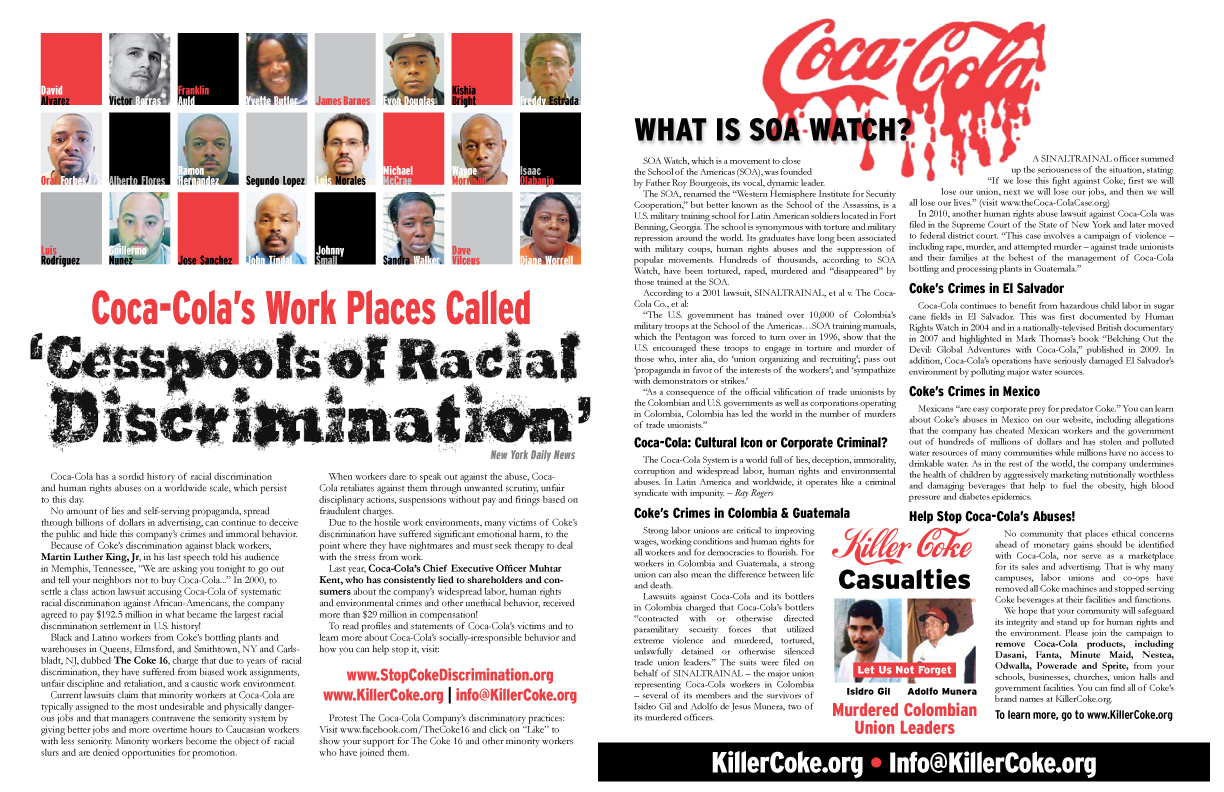
One interesting, and disturbing, event took place this year when artist/activist hip hop group, Rebel Diaz, exposed undercover police officers that had come to monitor activities at the convention center. A Rebel Diaz member had been speaking to Lew Friedman of the Campaign to Stop Killer Coke, when three middle-aged men began asking the Rebel Diaz member questions as to why he was at the convention. He immediately spotted them for whom they were: Columbus Police Officers.
After all eight police officers were exposed, hundreds of SOA attendees, including Code Pink founder Medea Benjamin, surrounded the officers singing and chanting. We were grateful that two of the officers chose to attend our workshop and they were warmly greeted and acknowledged by our campaign. (To read more about the undercover police operation, please read the following article written by our friend Tim Franzen of the American Friends Service Committee.)
While we hope that the School of Americas is shut down this year, we are always inspired by the people we meet at the vigil every year
To learn more about the School of Americas, please visit soaw.org
7. Soft drinks make Coke's polar bears unhappy and sick.
Watch this video produced by Center for Science in the Public Interest:
"The Real Bears," song by Jason Mraz
"The Real Bears" in English
"The Real Bears" in Spanish
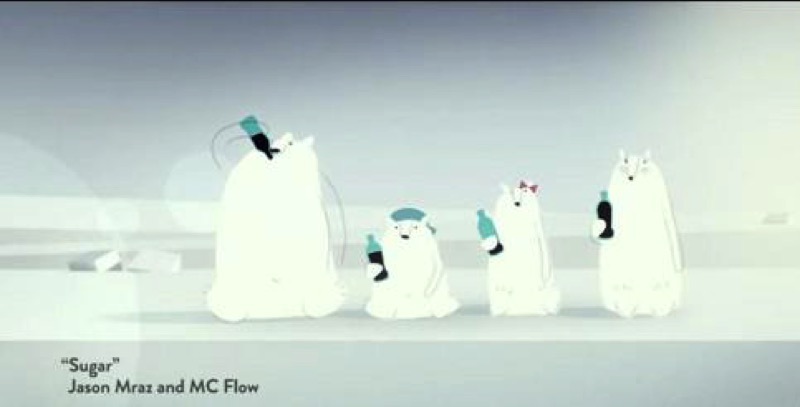
8. Joe Pilati (1947-2012)
Corporate Campaign staff member Joe Pilati passed away on June 8, 2012. Joe was a great advocate for labor and human rights. He loved cats, music and enjoyed listening to New York Mets games on radio. He was also a writer, journalist and editor extraordinaire. He read every daily NYC newspaper and volumes of books on every imaginable subject but particularly loved politics and writings promoting progressive causes.
He worked for the Boston Globe, the Boston Phoenix and the Village Voice, before joining the staff of the Amalgamated Clothing and Textile Workers Union in 1976 to work on the historic J.P. Stevens Campaign. Many New Yorkers may remember Joe as "Joe, the Socialist," a caller to the Alan Colmes Show on WEVD, often singing satirical parodies he authored. "He was a very generous man who sought little for himself and will be sorely missed," said Corporate Campaign Director Ray Rogers.
Since 1981, until his passing, Joe for many years was the chief writer and editor for Corporate Campaign, Inc. and conceptualized some o0f the most memorable leaflets and brochures that supported workers' struggles and important free speech and environmental issues. (See CorporateCampaign.org — Campaigns section). Much of his work at Corporate Campaign would outshine anything the best corporate advertisers on Madison Ave. could create.
Joe's writings, slogans and artwork concepts helped save WBAI and the Pacifica Radio Network; helped win major contract victories for thousands of NYC transit workers and other state employees; helped keep oil companies out of the Arctic National Wildlife Refuge and continue to help expose the horrific worldwide crimes committed by executives and board members of The Coca-Cola Company.
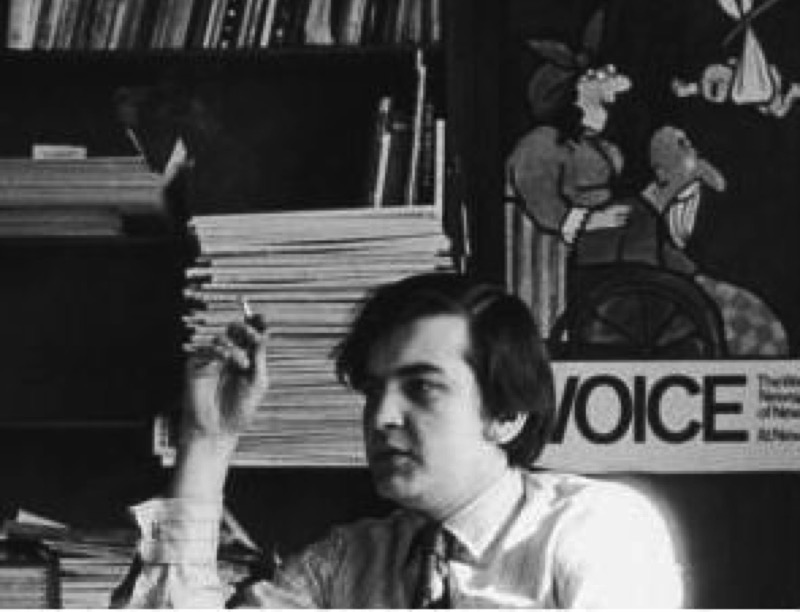
Born in Perth Amboy, NJ, Joe graduated from Pearl River High School, NY and later attended Boston University. He lived for most of his adult life near Union Square in New York City. He leaves a beloved sister Lori Pilati-Wentz and a brother-in-law Ted who reside in Georgia.
After graduating from high school, Joe was among the 2% of secondary school seniors nationwide to receive a Letter of Commendation from the National Merit Scholarship Program. The letter stated, "You have demonstrated outstanding ability and have brought credit to yourself and to your school."
Boston University Professor of Government Murray Levin wrote on February 29, 1968: "This letter is to introduce Mr. Joseph Pilati who was a student of mine in three political science courses ... he was an exceptional student whose comments in class were always relevant and penetrating... During the past year, Mr. Pilati assumed the editorialship of the Boston University News which, in my opinion, he has transformed into one of the most thoughtful and relevant college newspapers in our country. Under his leadership, the paper became a serious journal of opinion — a forum for debating university, national, and international problems... Under his direction, the paper was transformed from a typically hack college paper...into a forum for debating university reform, student power, civil rights, American foreign policy, etc..."
Dan Wakefield, Visiting Lecturer, College of Journalism and Communications, University of Illinois wrote in 1968: "Joseph Pilati is known to me as an exceptionally intelligent, capable, and talented young man...a man of deep convictions, of great personal as well as professional integrity, of conscience and honesty."
Robert Sproat, professor of English, Boston University wrote that same year: "...my respect for Mr. Pilati as a person is as high as the respect I have ever held for any student in my twenty-odd years of teaching...He is a high-minded and utterly trustworthy young man...Mr. Pilati has been one of the highlights of my career at Boston University."
Noted illustrator and friend Jay Lynch wrote in memoriam:
I knew Joe Pilati since we were kids. We were both fans of MAD magazine, and when Joe was 14 he began to publish a little fanzine called SMUDGE.
SMUDGE had a circulation of about 80 copies. It contained news and interviews with the editors, writers and artists of the various MAD style satire magazines of the era. This was in 1960, and Joe printed his mag on his school's ditto machine.
I did cartoons for Joe's mag. He was 14 years old at the time. I was 16. It's a long story, but lots of other kids who grew up to be professional cartoonists also subscribed to Joe's mag. Through this infant network of satire fandom is how me, Art Spiegelman, Skip Williamson, Robert Crumb and most of the guys who started underground comix in the late '60s originally got together.
By the time Joe was 16, he stopped publishing SMUDGE and started publishing another fanzine called ENCLAVE. Enclave was about Science Fiction and politics. I continued to do cartoons for Joe's new mag, which also contained new work by Harlan Ellison, Ray Nelson, and other young sci-fi writers.
Still the circulation remained tiny — Under 150 copies. But again, ENCLAVE is how we like-minded kids first got in touch with, and ultimately befriended each other.
As we got older, and went to college, we did work for the college mags. I worked for the humor mags doing cartoons. Joe worked for his college paper, and went on to write for the Boston Phoenix. I guess the Phoenix is still around. It started out in the late '60s as an underground paper, though. It was a bit more radical than issues I've run across in recent years. Joe's college and PHOENIX work got more political as what we call the '60s, which actually happened for the most part in the early '70s, got underway. Joe and I kept in touch. He wound up working for the old VILLAGE VOICE for a while, and when underground comix came about, and our paths crossed again, Joe worked on a serious underground comic published by Kitchen Sink publishing called CORPORATE CRIME COMIX. CORPORATE CRIME took irresponsible corporations to task by reporting their nefarious doings, using the comic strip format as a reporting technique.
Time passed, and I would see Joe on occasional visits to NYC. I guess it was in the late '90s that Joe and I began to collaborate on Corporate Campaign stuff. He would come up with ideas for leaflets and posters, and I would do the final art.
It was the precocious 14-year-old Joe Pilati who, with his SMUDGE fanzine, was responsible for getting many of the early underground cartoonists together eight years before there was such a thing as underground comix. Were it not for him, I might have wound up selling aluminum siding. But who knows? There might have been more dough in that line of work than in cartooning. So I don't know whether to praise him or curse him. But I loved the guy. And he will be deeply missed.
Jay Lynch is the founder of BIJOU FUNNIES, one of the first and most important underground comics of the Sixties, and for many years wrote the weekly syndicated comic strip, Phoebe and the Pigeon People. He has written for MAD, CRACKED, SICK, and TIME magazines, and has helped create some of Topps Chewing Gum's most popular humor products.
College buddy and now San Francisco journalist Jeff Kaliss wrote in memoriam:
I couldn't figure out how someone with a name like Joe Pilati would be walking around with pale skin, pale blue eyes, and sandy blond hair. Then he told me that his people were from Northern Italy, far from the swarthy dark-eyed dark-haired stereotype more commonly associated with spaghetti and the Mob.
Truth be told, Joe wasn't typical anything, though I got to know him within particular collegiate social contexts at Boston University in the mid-1960s: as a dormitory mischief-maker, an artful reporter on the Boston University News, and a campus radical. He wasn't like anybody else in those groups, either, always more ardent and yet more vulnerable than the rest of us.
After most of us on the BU News staff staged a strike, in protest of threatened faculty control, Joe generated brilliant cartoons for our strike newsletter. And when I later paid a visit to his family home in Pearl River, New York, he took me to nearby Manhattan to meet some of the veteran cartoonists who'd been his heroes, contributors to the likes of Mad magazine.
Joe could be fabulously funny and witty with words. Sharing these words about him now, I only wish I'd been able to share more with him while he was still around.











